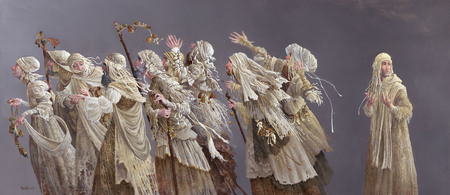
Last week I went to see the new movie “The Social Network.” It’s a fascinating look at the creation of “Facebook” – the social networking site that started among a few people at Harvard and became a phenomenon, now touching half a billion lives around the world.
One of the compelling elements of the story is how it all began — the reason the filmmakers give for why Facebook started in the first place.
In the first scene of the movie, Harvard undergraduate Mark Zuckerberg ends up being rejected by a girl while on a date. You can understand why: he’s really a jerk. But bent on revenge, and feeling like an outsider, he goes back to his dorm and sits down at his computer and sets out to create the ultimate “club” at Harvard – and succeeds beyond anyone’s wildest expectations.
Zuckerberg’s motivations in the movie are the kind any of us can recognize – but it comes down to more than just settling scores or even blind ambition.
It all comes down to wanting to be accepted — our need to belong to something, our yearning to love and to be loved.
That, for better or worse, is part of our humanity.
No one wants to feel like an outcast.
Which brings me to the 10 people Jesus encountered in today’s gospel.
They were the ultimate outcasts: lepers. They lived totally apart from others – diseased and disfigured. By law, they had to keep a certain distance from everyone else. They had to keep their faces covered. Other people could have nothing to do with them. In curing them, Christ offered them more than just a miraculous healing. He offered them a new life. A new way of life. A life in community – able to walk freely in the town, to worship with others, eat with others, to be accepted and even, perhaps, to be loved. They could finally have a life they had long been denied because of their disease.
All of that, on its own, is meaningful enough. But Luke throws in one sentence that makes it clear it’s about much more than another healing miracle.
“He was a Samaritan.”
The only one who went back to Jesus, who fell before him and gave thanks, was the outcast among all outcasts, a figure doubly despised. A Samaritan.
It’s important to remember that Luke was the only writer of the four gospels who was not Jewish. He was a gentile, probably Greek. Like the Samaritan, he was an outsider himself. And so again and again, he opens the gospel to a wider world.
The first chapters of Luke, with the nativity story, bring people from all over the world to Bethlehem – wise men, shepherds, angels, everyone. When tracing Christ’s geneology, Luke doesn’t begin with Abraham, as Matthew does, but with Adam – the father of us all. And in his gospel, Luke takes pains to write about all the despised people who are saved: the tax collectors, the prostitutes, the prodigal son, the penitent thief. And, of course, he also gives us two famous Samaritans: the Good Samaritan, and the man we met today, this healed Samaritan.
All these are people who might be considered outsiders or outcasts – but they are the ones in Luke’s gospel who repeatedly find healing, and salvation, and hope.
Just like the lone figure in this Sunday’s gospel.
The others who were miraculously cured went on with their lives. But this one Samaritan didn’t. He couldn’t. He had to turn around and go back to Christ and fall before him and give thanks.
But Christ made clear it was more than this gesture that changes this man’s life.
“Your faith,” Jesus tells him, “has saved you.”
Something stirred in this Samaritan’s heart, and moved him to reverse course, to go back to where it began – healed, renewed, redeemed. It was gratitude, but with a profound difference.
It was gratitude grounded in faith. Faith in something – and someone.
He understood that what really mattered wasn’t the gift…but the One who gave it.
And as Luke makes clear again and again in his beautiful gospel: that gift is offered to all.
All of us who stand outside the circle, who feel at one time or another rejected or cast out or unloved.
All of us who feel lonely or abandoned, desperate or despairing.
All of us who have felt bullied or betrayed.
Christ can make all of us whole, and healed.
Through the gift of his love and mercy, we no longer have to feel like lepers.
In the world of Facebook, the point of connection is to “friend” someone – some people I know have thousands of Facebook friends, most of them people they’ve never met.
I’m reminded of that old Protestant hymn that proclaims: “What a friend I have in Jesus.”
He is a friend we all have met – and one we will meet again in just a few minutes. The great gift of communion will join us once more to him, and join us together again as a body of believers, bound together by faith, healed together by Christ’s limitless love, redeemed together by his great sacrifice.
That’s the ultimate “social network,” the greatest in all of history.
This morning, let’s remember that – and, like the Samaritan, let’s cherish not only the gift … but the One who gave it.
Like the Samaritan, before we leave, let us turn back to the One who gave it — whispering our thanksgiving, praying in joyful hope that we too may one day hear the words that changed the life of that Samaritan forever:
“Your faith has saved you.”
